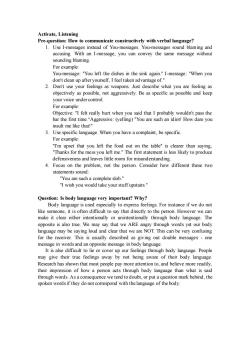《新编大学英语》综合教程(第三版第一册)B1U3_self-market_Samples

Activate,Listening Pre-question:How to communicate constructively with verbal language? 1.Use I-messages instead of You-messages.You-messages sound blaming and accusing.With an I-message,you can convey the same message without sound ing blaming. For example: You-message:"You left the dishes in the sink again."I-message:"When you don't clean up after yourself,I feel taken advantage of." 2.Don't use your feelings as weapons.Just describe what you are feeling as objectively as possible,not aggressively.Be as specific as possible and keep your voice under control. For example: Objective:"I felt really hurt when you said that I probably wouldn't pass the bar the first time."Aggressive:(yelling)"You are such an idiot!How dare you insult me like that!" 3.Use specific language.When you have a complaint,be specific. For example: "I'm upset that you left the food out on the table"is clearer than saying, "Thanks for the mess you left me."The first statement is less likely to produce defensiveness and leaves little room for misunderstanding. 4.Focus on the problem,not the person.Consider how different these two statements sound: "You are such a complete slob." "I wish you would take your stuff upstairs." Question:Is body language very important?Why? Body language is used especially to express feelings.For instance if we do not like someone,it is often difficult to say that directly to the person.However we can make it clear either intentionally or unintentionally through body language.The opposite is also true.We may say that we ARE angry through words yet our body language may be saying loud and clear that we are NOT.This can be very confusing for the receiver.This is usually described as giving out double messages-one message in words and an opposite message in body language. It is also difficult to lie or cover up our feelings through body language.People may give their true feelings away by not being aware of their body language. Research has shown that most people pay more attention to,and believe more readily, their impression of how a person acts through body language than what is said through words.As a consequence we tend to doubt,or put a question mark behind,the spoken words if they do not correspond with the language of the body
Activate, Listening Pre-question: How to communicate constructively with verbal language? 1. Use I-messages instead of You-messages. You-messages sound blaming and accusing. With an I-message, you can convey the same message without sounding blaming. For example: You-message: "You left the dishes in the sink again." I-message: "When you don't clean up after yourself, I feel taken advantage of." 2. Don't use your feelings as weapons. Just describe what you are feeling as objectively as possible, not aggressively. Be as specific as possible and keep your voice under control. For example: Objective: "I felt really hurt when you said that I probably wouldn't pass the bar the first time.“Aggressive: (yelling) "You are such an idiot! How dare you insult me like that!" 3. Use specific language. When you have a complaint, be specific. For example: "I'm upset that you left the food out on the table" is clearer than saying, "Thanks for the mess you left me." The first statement is less likely to produce defensiveness and leaves little room for misunderstanding. 4. Focus on the problem, not the person. Consider how different these two statements sound: "You are such a complete slob." "I wish you would take your stuff upstairs." Question: Is body language very important? Why? Body language is used especially to express feelings. For instance if we do not like someone, it is often difficult to say that directly to the person. However we can make it clear either intentionally or unintentionally through body language. The opposite is also true. We may say that we ARE angry through words yet our body language may be saying loud and clear that we are NOT. This can be very confusing for the receiver. This is usually described as giving out double messages - one message in words and an opposite message in body language. It is also difficult to lie or cover up our feelings through body language. People may give their true feelings away by not being aware of their body language. Research has shown that most people pay more attention to, and believe more readily, their impression of how a person acts through body language than what is said through words. As a consequence we tend to doubt, or put a question mark behind, the spoken words if they do not correspond with the language of the body
按次数下载不扣除下载券;
注册用户24小时内重复下载只扣除一次;
顺序:VIP每日次数-->可用次数-->下载券;
- 《新编大学英语》综合教程(第三版第一册)B1U3_self-market_Reading Material_第三单元课文背景材料.doc
- 《新编大学英语》综合教程(第三版第一册)B1U3_self-market_Reading Material_第三单元 课文翻译及课后练习答案.doc
- 《新编大学英语》综合教程(第三版第一册)B1U3_self-market_Reading Material_unit 3活动directions.doc
- 《新编大学英语》综合教程(第三版第一册)B1U3_self-market_Reading Material_Unit 3活动.doc
- 《新编大学英语》综合教程(第三版第一册)B1U3_self-market_Reading Material_How Do I Get Him or Her To Talk To Me.doc
- 《新编大学英语》综合教程(第三版第一册)B1U3_self-market_Reading Material_communication famous saying.doc
- 《新编大学英语》综合教程(第三版第一册)B1U3_self-market_Reading Material_barriers to effective human Communication.doc
- 《新编大学英语》综合教程(第三版第一册)B1U3_self-market_QUIZ_Written Quiz.doc
- 《新编大学英语》综合教程(第三版第一册)B1U3_self-market_QUIZ_Oral Quiz.ppt
- 《新编大学英语》综合教程(第三版第一册)B1U3_self-market_Listening Material_How to Help Your Baby Learn to Talk Try Talking to Your Baby.doc
- 《新编大学英语》综合教程(第三版第一册)B1U3_self-market_Grammar and Vocabulary.doc
- 《新编大学英语》综合教程(第三版第一册)B1U3_English body language.doc
- 《新编大学英语》综合教程(第三版第一册)B1U2_Translation & Writing.ppt
- 《新编大学英语》综合教程(第三版第一册)B1U2_self market_Writing Material_How to Write a Personal Experience.doc
- 《新编大学英语》综合教程(第三版第一册)B1U2_self market_U2B1 QUIZ_Written Quiz_written quiz.doc
- 《新编大学英语》综合教程(第三版第一册)B1U2_self market_U2B1 QUIZ_06 B2U01 Oral Quiz.ppt
- 《新编大学英语》综合教程(第三版第一册)B1U2_self market_Reading Material_课文背景材料.doc
- 《新编大学英语》综合教程(第三版第一册)B1U2_self market_Reading Material_课文翻译及课后练习答案.doc
- 《新编大学英语》综合教程(第三版第一册)B1U2_self market_Reading Material_Remember Me When I am Gone Away.doc
- 《新编大学英语》综合教程(第三版第一册)B1U2_self market_Reading Material_My Personal Experience——-A Funny Memory.doc
- 《新编大学英语》综合教程(第三版第一册)B1U3_self-market_Writing Material_How to Get Rid Of Nervousness.doc
- 《新编大学英语》综合教程(第三版第一册)B1U3_self-market_Writing Material_How to Give Advice.doc
- 《新编大学英语》综合教程(第三版第一册)B1U3_U3 Activate.ppt
- 《新编大学英语》综合教程(第三版第一册)B1U3_U3 Menu.ppt
- 《新编大学英语》综合教程(第三版第一册)B1U3_U3 Read by critical thinking.ppt
- 《新编大学英语》综合教程(第三版第一册)B1U3_U3 Translation & Writing.ppt
- 《新编大学英语》综合教程(第三版第一册)B1U4_Activate.ppt
- 《新编大学英语》综合教程(第三版第一册)B1U4_Do it or not, never say I will try.doc
- 《新编大学英语》综合教程(第三版第一册)B1U4_Menu.ppt
- 《新编大学英语》综合教程(第三版第一册)B1U4_Read by critical thinking.ppt
- 《新编大学英语》综合教程(第三版第一册)B1U4_self-market_B1U04 QUIZ_B1U04 Oral Quiz.ppt
- 《新编大学英语》综合教程(第三版第一册)B1U4_self-market_B1U04 QUIZ_B1U04 Written Quiz.doc
- 《新编大学英语》综合教程(第三版第一册)B1U4_self-market_Grammar and Vocabulary.doc
- 《新编大学英语》综合教程(第三版第一册)B1U4_self-market_Reading Material_President’s welcome.doc
- 《新编大学英语》综合教程(第三版第一册)B1U4_self-market_Reading Material_演讲稿 My Expectation of University.doc
- 《新编大学英语》综合教程(第三版第一册)B1U4_self-market_Reading Material_演讲稿 My University Life.doc
- 《新编大学英语》综合教程(第三版第一册)B1U4_self-market_Reading Material_第4单元 课文翻译及课后练习答案.doc
- 《新编大学英语》综合教程(第三版第一册)B1U4_self-market_Reading Material_第4单元课文背景材料.doc
- 《新编大学英语》综合教程(第三版第一册)B1U4_self-market_Samples_Activate Task Three.doc
- 《新编大学英语》综合教程(第三版第一册)B1U4_self-market_Samples_Read by Critical Thinking Before Reading.doc
